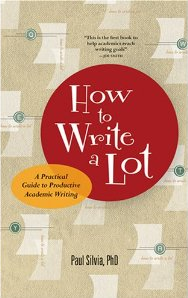I’ve been on a bit of a reading kick lately. In truth, most of it is for various research projects for my doctorate degree, but I’ve managed to squeeze in more “fun” reading on the side.
One such “fun” reading book is Dr. Paul Silva’s How to Write a Lot: A Practical Guide to Productive Academic Writing. This little 132-page read has gotten me re-inspired and re-invigorated to keep my blogging, podcast, and academic writing mojo going.
Here’s what I like about the book:
- Dr. Silva–though given his writing style, I imagine he’d prefer to be called “Paul”–has an easy-to-read style that’s smart without sounding too “academic” and jargony (which fits nicely, as I’ll mention below, with his belief that you shouldn’t write in a style that sounds too acadamic and jargony…)
- He offers practical tips and useful suggestions for creating and sticking to a writing schedule. They’re logistical and motivational. Ideas like setting goals, establishing priorities, and tracking progress. I couldn’t help but wonder whether the author had read David Allen’s book Getting Things Done
.
- Perhaps it’s the blogger in me that appreciates writers who explain complex topics in an accessible way, but Paul offers grammatical and stylistic suggestions for making academic and scholarly writing easy-to-understand. Suggestions like choosing good words (The English language has a lot of words, and many of them are short, expressive, and familiar–write with these words, pg. 61) and writing strong sentences (By overusing a single type of sentence, bad writers sound like they’re speaking in a dicursive drone. English has three types of sentences… pg. 65). You don’t have to “sound” smart and jargony to write in a smart way.
- Dr. Silva—Paul—is a psychology professor. Thus, in addition to providing practical and concrete tips, he also delves a little into the psychological and perceived barriers we must acknowledge and work with to be prolific writers. And offers ideas to help…like starting your own agraphia group (kind of like Napolean Hill’s idea
of a mastermind group, but for writers).
- It’s funny! Admittedly most of the humor is academically-related, but I chuckled out loud several times. Complaining is an academic’s birthright. The art of complaining develops early, when undergraduates complain about their professors, their textbooks, and the cosmic unfairness of 9:00 a.m. Friday classes. (pg. 49) Psychology journals are like the mean jocks and aloof rich girls in the 1980s high school movie–they reject all but the beautiful and persistent. (pg. 77)
This book is definitely geared towards the academic and scholarly writer, but I think it is a useful resource for you bloggers out there, as well as to those of you who do any sort of regular writing (can you say “clinical documentation”?). It was also validating for me to read another academic who agrees with me that scholarly writing does not have to sound academic. It can be well-written, well-constructed…and still easily understood.
How to Write a Lot was not a life-changing book for me. But it has giving me a kick-in-the-pants to keep up my writing and I will revisit it from time to time for a refresher read.



 orcid.org/0000-0001-8665-1493
orcid.org/0000-0001-8665-1493






{ 2 comments… read them below or add one }
Thanks for the review, Kimberly. I’ve had this book sitting quietly on top of a book pile waiting for me to have a chance to read it (I guess I need to stop borrowing yet more books from the library) (book problem? Anyone? Anyone?). I think Andrew Knight recommended it a while ago. Anyway, now that I’ve read your review I’m looking forward to reading it even more. I absolutely agree that academic material should be written in an accessible way. It’s great to have a large vocabulary, but being able to explain difficult concepts to anyone should (in my noisy opinion) be the real point. It’s way more inclusive.
It’ll probably take you an afternoon to read it 🙂 I love the idea of accessible writing being more inclusive…I hadn’t considered that take on it before! ~Kimberly
You must log in to post a comment.